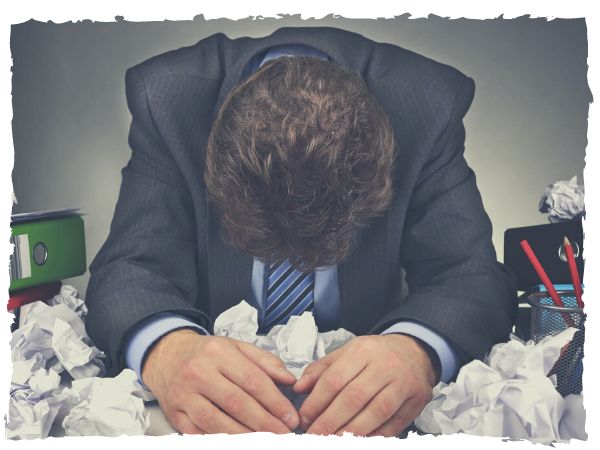Failure hurts… but it is also something you will have to deal with in your life because it is simply part of the journey. The trick is learning how to effectively deal with the inevitable failures you will experience, which will help you get past them and grow as a person.
We need to take time to explore the different things we can do to accept the ebbs and flows throughout life… and not allow them to keep us from trying again and moving forward. Learning to fail is a skill you need to cultivate and practice to develop resilience.
Let's get started.
Why Failure Hurts
We are all too familiar with the many emotions that rise to the surface when we fail. You may feel anger, embarrassment, or hopelessness. Depression and anxiety may also set in, as you use negative self-talk to berate yourself. You may feel helpless, thinking you will never succeed at what you are trying to accomplish.
These feelings are often more severe if the failure comes at the end of a long, hard road of trying. This is a natural reaction. You are disappointed and that is fine…. but remember that these feelings are temporary and can be used as motivation to try again.
Our irrational beliefs about failure are often what makes these feelings worse. You may believe that one failure means you are worthless and incapable of succeeding.
You may see this as the universe trying to stop you from getting where you want to be. Or maybe you are worried about how others will react to your setbacks. All of these false beliefs will make the failure eat away at you… but it doesn’t have to. You have the power to control your reactions.
Before we discuss how to deal with failure, let's consider what you don't want to do.
What Not to Do When You Fail
Many of us have fallen into unhealthy coping habits — things we do when we are feeling down, insignificant, or unworthy. It is important to recognize these unhealthy coping mechanisms and replace them with healthier, more productive ones.
When dealing with failure, be careful that you DO NOT:
Now, let's look at some of the healthy ways you can deal with failure.
How to Deal With Failure in a Positive Way
Now that you know what things you should avoid doing when you are in the face of failure, it is time to look at some things you can do. Keep in mind, not every method will work for every person.
You need to consider which things resonate with you and fit your personal style. The more steps you can take, the sooner you will see that sought-after success.
1. Develop a Growth Mindset
When you feel failure is the end and that you will never achieve success, you are exhibiting a fixed mindset. This is often the greatest reason people remain in the same place permanently. It is important to strive to develop a growth mindset.
This means that you need to look at the failure as simply one step in the whole process. View it as a chance to step back and rethink your approach so you can move forward at a smoother pace the next time you try.
A growth mindset is like viewing a dead end as a place to turn around, not a roadblock.
2. Learn From Famous Failures
Did you know that Elvis Presley failed his music classes? And that Michael Jordan missed the winning shot in 26 games? Many of the greatest success stories have come about after many failures. The point to make, however, is that these people didn't allow failure to stop them from continuing to follow their dreams.

One of the best things you can do when you’re feeling like you aren't good enough is to spend time reading about the many individuals who didn't allow one or a dozen (or more) failures to deter them. Take inspiration from them and examine the traits they used to help them harness the lessons in their failures to keep on going.
3. See Failures as Lessons
Instead of looking at one method of approaching a situation as the only way, you need to view it as one of many. Instead of focusing on the failure, look at it as finding one way that didn't work.
Find out why it didn't work and use that knowledge to avoid making the same mistakes. Learning from failure is one of the greatest ways to achieve success eventually. After all, once you eliminate all the ways that don't work, that only leaves the way or ways that will work.
4. Accept Responsibility
Women tend to internalize their failures and put all the blame on themselves, which creates low self-esteem and negativity. Conversely, men tend to place the blame outwardly on circumstances other than themselves, such as bad luck.
Both extremes are detrimental to coping with failure and moving forward. It is important to admit the part you had to play in the failure. Recognize the mistakes you may have made and what you could have done differently… but don't dwell on them.
Instead, use that knowledge when you try again. Success is never achieved without action from you, and you need to recognize that.
5. Remind Yourself of Past Failures and Successes
You have been failing and succeeding since you were born into this life. Think back to the time when you were learning to walk.
Babies have this failing thing all figured out. You may have noticed how a baby will fall on their behind time and time again, but get back up and try taking another step. They practice and practice until one day, they simply take off across the room, one step after another.
You did the same.
Look back over the years and take note of your setbacks. None of those were the end of the world, were they? Now, think about all the times you achieved success.
One failure doesn't make YOU a failure. You were still able to succeed. Remind yourself of that as often as you need to, and make time to encourage yourself as you would someone you love.
6. Don't Make It Personal
Making each failure personal is a big mistake. You are not the failure. Every person comprises hundreds of different facets and can't be defined by one act.
When your boss reprimands you for being late, don’t you think it is unfair that they judge your entire performance on the job by one act? Now, think about your spouse or partner. Would you end the relationship because they had a bad day or forgot your birthday once?
Give yourself the same consideration you would others and realize that one failure doesn't define you. Put it in the past and move forward. There is so much more to who you are and what you can accomplish.
7. See Failure from a Different Perspective
When you have faced a failure, it is the perfect time to start reframing your thoughts. Every time you engage in negative self-talk, take a deep breath and reframe the thought. For example, instead of saying, “I failed,” tell yourself, “That failed.”
You can also change the idea that “This will never work” into something like, “That method didn't work, but maybe this one will!”
At first, reframing your thoughts takes some work. However, the more you practice it, the easier it becomes because your brain will start creating different neural pathways.
8. Recognize Your Emotions
Just as the Stoics believed that events are neither good nor bad, the same is true of emotions. While we assign positive or negative traits to emotions, they are actually neutral.
What is important is how you respond to individual emotions. Ignoring them creates a problem. When you deny an emotion, it keeps pushing itself to the forefront. It wants to be recognized and dealt with so it can allow you to free up energy that can be used for action.

This is where mindfulness can help. Mindfulness allows you to observe the emotion, recognize it, and then allow it to move on without judgment. Once you recognize your feelings, you can ask yourself what purpose it serves and then let it to go.
9. Stop Worrying About What Others Think
One of the biggest reasons we fear failure is spending too much time worrying about what others will think of us. The truth is that they most likely do not think about our mistakes at all.
Every person has their worries, and while they may notice your mistake at the moment, they will soon replace that information with whatever is pressing on their minds. As long as nobody was hurt in the process, permit yourself to move on with the knowledge that the ones who saw your failure already have gone on to things that are of greater importance to them personally.
10. Create a Plan of Action
Take time to follow your failed attempt back to the start. Note each decision you made along the way and figure out which ones worked and which ones could have been made differently.
Ask yourself what would have happened if you had made a different decision and what other decisions were available. Keep note of all of these and create a new plan of action, with now being the new beginning and your goal as the end.
You might even want to create a vision board to bring the plan to life. Create a new roadmap for your path and then set out to change the outcome by making decisions based on the information you gathered from your evaluation.
11. Take a Deep Look at Yourself
Go grab your journal. Okay, it is now time to take a really deep look into who you are and what you believe success will look and feel like. Look back on your life and the major failures you have experienced.
Examine them and see if you can find a pattern. Do you skip steps or fail to plan thoroughly? Are you practicing self-sabotage because you secretly fear success?
Once you can see all this written out, patterns of thought and behavior will become apparent. Before attempting to try again, work on the things that are stopping you.
Once your emotional state is clear and you are able to eliminate any personal roadblocks, you will be able to embark on your path with a newfound sense of determination and less chance of making the same mistake again.
Final Thoughts on How to Deal With Failure
Failure is inevitable from time to time. This does not mean you will never succeed. By developing resilience, you will be able to face failure and see it as a chance to learn and grow.
Life doesn't expect us to be or even become perfect. All it asks of us is to accept that all things positive, like success, must have a counterpart.
By overcoming the pain of failure, we can fully appreciate success when we do achieve it — and you will achieve it if you keep on going and don't give up! After all, perseverance is one of the best basic core values.
See more ideas on success and failure:
- Failure is the Mother of Success: 3 Thoughts
- 67 Success and Failure Quotes to Be Successful
- Success is Not Final: 4 Lessons from a Famous Winston Churchill Quote
Finally, if you want to take your goal-setting efforts to the next level, check out this FREE printable worksheet and a step-by-step process that will help you set effective SMART goals.


